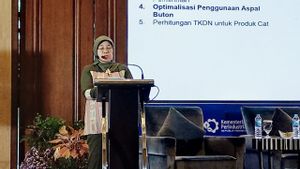YOGYAKARTA Many people try to lose weight in various ways. Starting from regular exercise, changing your diet, to consuming products to undergo a weight loss program. Whatever the reasons and methods you take, it is important for you to understand the benefits and risks of losing weight. Well, if your weight has dropped, what happens to the body? So, does your weight lose drastically, still have a positive impact? In full, check the explanation below.
Where do fats accumulate and cause weight to drop? Fat cells are stored in triglyceride form. If body energy is not used, then a pile of fat-shaped energy deposits is stored so that it affects weight. The term burns fat' actually describes a complex hormonal and enzymeic pathway where triglycerides are released into the bloodstream to be transported anywhere in the body to be used as energy.
When they lose their fat, fat cells don't go anywhere. They stay in place, under the skin and above the muscles. If fat cells are used as energy sources, as a result, these deposits shrink. Just like fat cells that shrink when they lose fat, adipose tissue can also grow along with the increase in fat deposits in the body.
When you lose weight, you don't just lose fat. According to New York City-based dietist Jasmine Respect, MS., RD., CDN., a common misconception is when targeting fat loss in certain areas.
"If you don't eat enough to meet your energy needs, your body will switch to glycogen reserves, then your muscles and fat to use as energy," said Respect reported by Eating Well, Tuesday, January 9.
As a result, the percentage of fat-free masses that include water, frame muscles, and even bone masses, usually decreases along with weight loss. According to research, participants who lose weight by limiting calories experience extreme muscle mass. In contrast to participants who achieve weight loss due to exercise, they can maintain fat-free mass. In addition, some groups of people may be at risk of certain fat-free mass loss during weight loss, including people aftermenopaus, the elderly, people with metabolic diseases, and athletes.
This means that it is important to balance physical activity by avoiding cutting complete food groups. The goal is to prevent a decrease in muscle mass along with weight loss.
It is important to understand ideal weight. It is also important to lose weight according to medical procedures or not significantly in a short time. Research shows, lowering about 5-10 percent of body weight, can manage blood pressure, cholesterol, and blood sugar levels. It also helps reduce risk or prevent chronic diseases, has better body metabolism, and avoid cardiovascular disease and diabetes.
The medical community often focuses on changing weight and BMI to determine a person's overall health. What really helps us determine health is this blood marker. BMI only tells you a person's height in relation to his weight and is never meant to be used as a health indicator," said Respect.
SEE ALSO:
Well, what is challenging in managing weight loss is maintaining a healthy diet for a long time. Because according to Respect, when you eat a little, the body will respond by increasing appetite and food shipping. The key to a sustainable weight loss is to eliminate restrictions and focus on a balanced and nutritious diet that is easy to adapt.
As explained above, launching Healthline, rapid weight loss in the short term can lead to loss of muscle mass, lack of nutrition, and bile. Weight loss is slowly less at risk. According to many experts, losing 0.45-0.9 kilograms per week is a healthy and safe number.
Losing faster than that figure can put you at risk for many health problems. Including loss of muscles, bile, lack of nutrients, and drop in metabolism. In addition, weight loss is too fast on a strict diet, having side effects such as hunger, fatigue, irritability, coldness, muscle cramps, dizziness, constipation or diarrhea, and dehydration.
The English, Chinese, Japanese, Arabic, and French versions are automatically generated by the AI. So there may still be inaccuracies in translating, please always see Indonesian as our main language. (system supported by DigitalSiber.id)


















